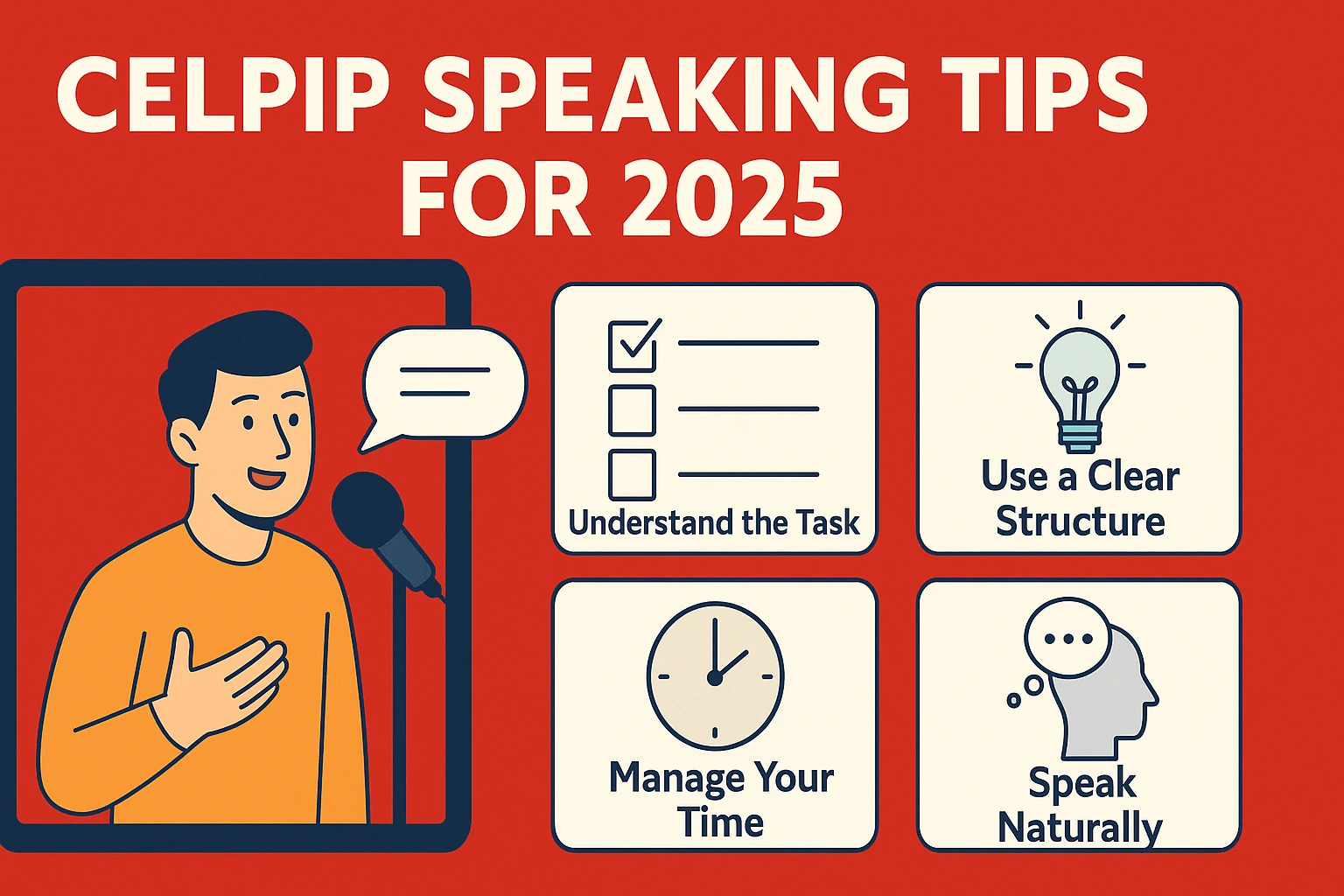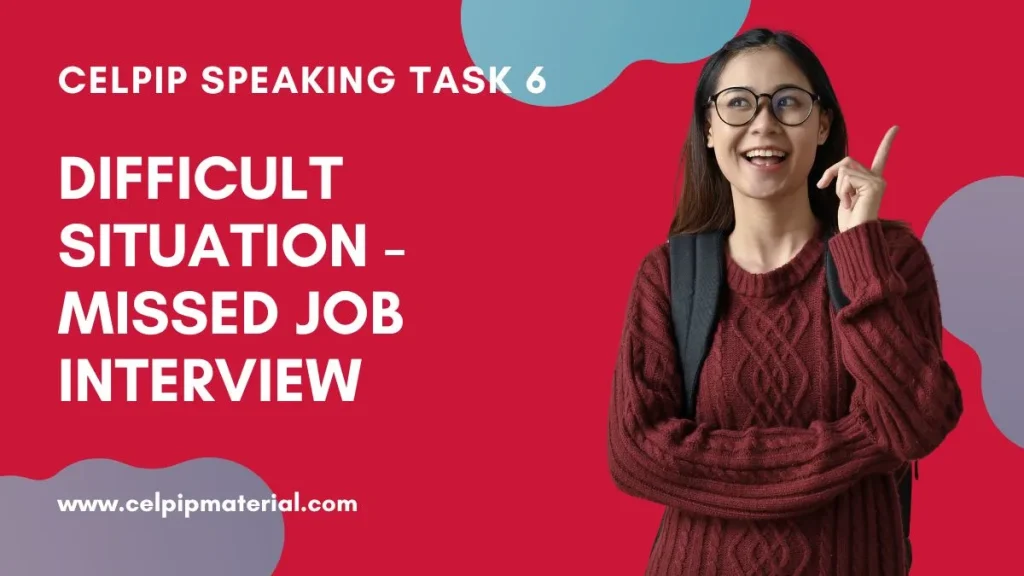
CELPIP Speaking Tips for 2025
CELPIP Speaking Tips for 2025
Boost your CELPIP Speaking tips for 2025 with expert tips on pronunciation, and time management. Learn how to speak confidently for top results.
1. Speak Clearly and Naturally
Why The scoring system values clarity and natural delivery. If the examiner can’t understand you, your score will suffer.
How ?
- Pronounce each word carefully, but don’t over-enunciate – keep it natural.
- Avoid mumbling or speaking too fast. Speaking too quickly can cause slurring and mistakes.
- Use a steady pace, aiming for about 120–150 words per minute — natural conversational speed.
- Practice challenging sounds that are common in English, like “th” (think, this), “v” (very), and ending sounds (cats, dogs).
2. Organize Your Response
- Why Clear structure helps the evaluator follow your ideas easily.
- How Use a simple 3-part structure for every response:
1. Introduction: State your main opinion or idea clearly.
2. Body: Give 1 or 2 supporting reasons/examples.
3. Conclusion: Summarize or restate your position briefly.
Example for a task like Describe a memorable trip:
One memorable trip I took was to Niagara Falls last summer. First, the stunning waterfall was breathtaking and unlike anything I had seen before. Second, I enjoyed exploring the surrounding parks and trying local food. Overall, it was an unforgettable experience.
3. Use Everyday Vocabulary and Expressions
Why Using language you’re comfortable with helps you sound confident and natural.
How
- Avoid complicated or rare words unless you’re very sure how to use them correctly.
- Use common, everyday words accurately – clarity over complexity wins points.
- Include idiomatic expressions and Canadian English phrases where appropriate, such as:
- “I’m feeling under the weather” (I’m sick)
- “Catch up” (meet and talk)
- “No worries” (It’s okay)
4. Practice Paraphrasing and Rephrasing
Why Paraphrasing shows your ability to express the same idea in different ways – a skill highly valued in CELPIP.
How
- When restating the question or idea, don’t repeat it word-for-word. Instead, use synonyms or a different sentence structure.
- Example: Question: “Describe your favorite hobby.”
Paraphrased: “One activity I really enjoy during my free time is…”
5. Stay on Topic
Why Relevance is key. Going off-topic wastes time and weakens your response.
How
- Listen or read the prompt carefully, and make sure your answer directly addresses it.
- Avoid irrelevant details or unrelated stories.
- If you’re unsure, quickly jot down key points before speaking to keep your answer focused.
6. Use Fillers Smoothly
Why Natural fillers make your speech sound more conversational and fluent.
How
- Use fillers like “well,” “actually,” “you know,” and “let me think” sparingly to buy thinking time.
- Don’t overuse them, or it will sound unnatural and distracting.
- Practice using fillers in mock speaking sessions to sound confident but natural.
7. Manage Your Time Wisely
Why Each speaking task has a fixed time limit (usually 40 seconds). You need to give a complete answer within that time.
How
- Practice timing yourself while answering common CELPIP speaking questions.
- Aim for about 3–4 sentences for shorter answers, and 5–6 sentences for longer ones.
- If you finish early, add a short conclusion to fill the time naturally.
- Avoid rambling or going off-topic just to fill time.
8. Record and Review Yourself
Why Self-assessment helps identify your strengths and weaknesses.
How
- Use your phone or computer to record practice answers.
- Listen for pronunciation errors, grammar mistakes, or unclear points.
- Note down repeated errors and work on improving them.
- Compare your recordings to sample high-scoring answers online.
9. Stay Calm and Confident
Why Nervousness affects fluency, pronunciation, and coherence. Confidence improves your delivery.
How
- Before starting, take deep breaths to calm nerves.
- Visualize yourself doing well to build confidence.
- Practice speaking daily to build familiarity and reduce anxiety.
- Remind yourself that it’s okay to pause briefly to gather your thoughts.
Bonus Tip: Use Positive and Polite Language
Positive language creates a good impression, especially in opinion or advice tasks.
Use polite expressions like:
- “I believe that…”
- “In my opinion…”
- “It would be beneficial if…”
Avoid negative or harsh tones.
Sample Practice Task with Model Answer
Task: Describe a memorable event you attended recently.
Answer:
One memorable event I attended recently was my friend’s wedding. The ceremony took place in a beautiful garden, and everyone was very happy. The decorations were colorful and elegant, which created a joyful atmosphere. Also, I enjoyed meeting new people and trying delicious food. Overall, it was a wonderful experience that I will always remember.
Also Check – CELPIP Speaking Test Format and Scoring











